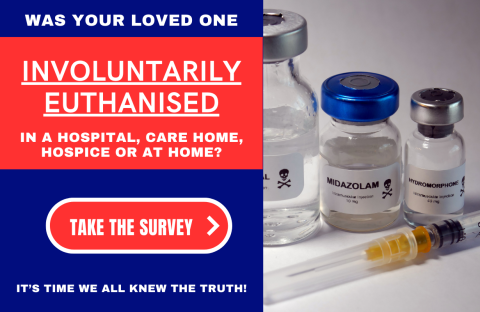Daughter Raises Concerns Over Alleged Neglect and Lack of Transparency at Lorna House Care Home
Aileen's father, Hugh was battling with early onset dementia, He was placed in Lorna House care home in Torquay where his life sadly ended.
Despite being Hugh's daughter, Aileen lacked Power of Attorney (POA) or Executor status, leaving her with limited authority over his affairs. The POA was a woman with whom her dad had shared a 30-year relationship with. Regrettably, Hugh never put his name on shared utility bills, creating complications when his partner demanded he be taken to a care home for respite. Social Services sided with her, believing she owned the property. Apprently she'd told them "he was just a lodger," and had only lived with her for seven years!
Was There A Conflict Of Interest: Did He Actually Need To Be In A Care Home?
Amidst the turmoil, Hugh's partner promised to bring his beloved dog to visit him regularly if he agreed to go into the care home. She didn't keep this promise. Care home staff described him as "bereft" at not being able to spend the time he was promised with the pet he adored. He was also told he would only be in there for six weeks respite, this soon became eight then twelve weeks and sadly he ended his life there.
Aileen along with staff at the care home, questioned why her father was placed there, as other than occasional forgetfulness, he could still manage to feed, dress himself, and even take his dog for walks. Her concerns about the premature admission were ignored, partly, she believed, because at that time her father was self-funding his care.
Moreover, Aileen strongly believed that the POA's involvement in her father's affairs posed a conflict of interest, given she would most likely inherit everything. She had a history of verbally abusing her father which was also picked up by care home staff. On one occassion they contacted Aileen regarding an incident where they had to ask her father's partner to leave, as not only was she upsetting him, she was also upsetting other residents.
Questions And Complaints Fell On Deaf Ears And Visiting Was Blocked
Aileen's complaints to the Office of the Public Guardian (OPG) were largely ignored because the care home did not support her claims. They wrongly believed it was her father's partner paying his care bills. This further hindered Aileen's attempts to advocate for her father's interests.
According to the Mental Capacity Act, decisions should be made in the patient's best interest, and those closest to the person must be consulted. Yet, Aileen was deliberately left out of her father's journey, even during the decision to put him on end-of-life care. A block on her communication with the care home prevented her from accessing basic information about his health and wellbeing. Aileen also questioned whether the right questions had been asked of her father's partner for them to adequately assess the impact of her decisions on him.
Adding to the heartbreak, Aileen discovered a comment in her father's care pathway notes that hinted at complications with her involvement which said "things could get tricky re - daughter". This was written the day before a block was placed on Aileen preventing her from seeing her father.
No Warning That Father's Condition Had Deteriated Or That He'd Been Placed On End-Of-Life
The morning of her father's passing was fraught with communication breakdowns. Doctors at the care home failed to inform Aileen that an ambulance had been called for him. One of the doctors later stated the she was absolutely 100% sure she informed Aileen of her father's condition and went on to say she couldn't remember why the block was placed on her, although she did make notes of the conversation with her Dad's partner who had POA!
Later that day her Dad took a turn for the worst and was moved to a new room upstairs. A Treatment Escalation Plan (TEP) was in place with a "No admission to hospital" already checked. The community nurse arrived and after assessment decided Just In Case Bags (JICB) medication should be administered. Her Dad was then put on Midazolam and Morphine and approximately fourty minutes later he died with no family members present.
Trying To Understand What Happened
Aileen had no idea her Dad had passed until the care home manager called later that day. When she asked what had happened the manager said she didn't know as she "wasn't a doctor". Aileen continued to probe, asking questions like "did he have a heart attack?", "did he have a fall?". Eventually she uttered "palliative care" which meant nothing to Aileen at the time.
Over the next few days Aileen heaerd nothing, so made an appointment with the doctor who dealt with her father to try and find out exactly what happened. The palliative care nurse, who was instrumental in her father's care and administered the lethal concoction had also volunteered to attend. At the meeting they answered Aileen's question like "what is JICB?", "is it a painkiller?". The doctor explained that it was to help with mucus around the time of passing to make a patient comfortable and confirmed it wasn't a pain killer. Aileen questioned why they administered JICB given her father had breathing difficulties and it was a suppressant. She was told it was "for agitation".
Lies And Cover Ups
The nurse led Aileen to believe her father had someone with him at the time of passing, but in detailed notes she received later on, it stated he was alone. This devastated her! Even if it were his partner, it would have brought some comfort to know he didn't die alone. When questioned at a later date the nurse denied saying someone was with him.
Over the months that followed, Aileen was drip fed her Dad's medical notes. Now she could work out timelines and quickly realised that they had plenty of opportunity to update her on his condition. There was approximately one and a half hours from when he took a turn for the worse and when he died: Aileen lived just 15 minutes away so could have got there quickly! The doctor said she thought the care home was updating Aileen.
There appeared to be a lot of "self-preservation and obstructive behaviour" when it came to asking for explanations, notes etc. Not to mention many breaches of law and overall malfeasance of their duty of care. The home also went into special measures months after Aileen's complaint. Their promise that "they would make the necessary improvements by learning from their mistakes" did not happen!
It was clear to Aileen that special end-of-life protocols were being used to hasten her dad's passing and to this day she has no idea what was in the nurse's assessment that triggered them to administer the Midazolam and Morphine.
Aileen has since taken her case to the Ombudsman. She firmly believes that her inclusion in the decision-making process from the outset could have changed the outcome. She rightfully expresses her anger towards the treatment she and her father received, the lack of patient-centreed care, and the withholding of crucial information that deeply impacted their last weeks together.
If you have lost a loved one to this cruel practice, please take the survey! The more people who take it the more insight we will have. Please also share with family, friends and across your networks. Lets get the truth out there! Click here or on the image below to take the survey.
The following videos give a deeper understanding of what has and is continuing to happen. The first is a documentary covering the stories of family who lost their loved ones to involuntary euthanasia. The second video is Michael Elston who is raising awareness of the new Nice Guidelines for NG163 protocol:
Jacqui Deevoy is a freelance journalist who spent many years writing for major British newspapers. Around two years ago she began investigating how a banished euthanasia program had returned to British hospitals—coinciding with the onset of COVID-19.
Michael Elston speaking from Altrincham Town Hall concerning NHS England's reintroduction of involuntary euthanasia as part of its response to the covid-19 pandemic because this country simply does not have enough hospital beds to treat everyone.
When you subscribe to the blog, we will send you an e-mail when there are new updates on the site so you wouldn't miss them.




Comments